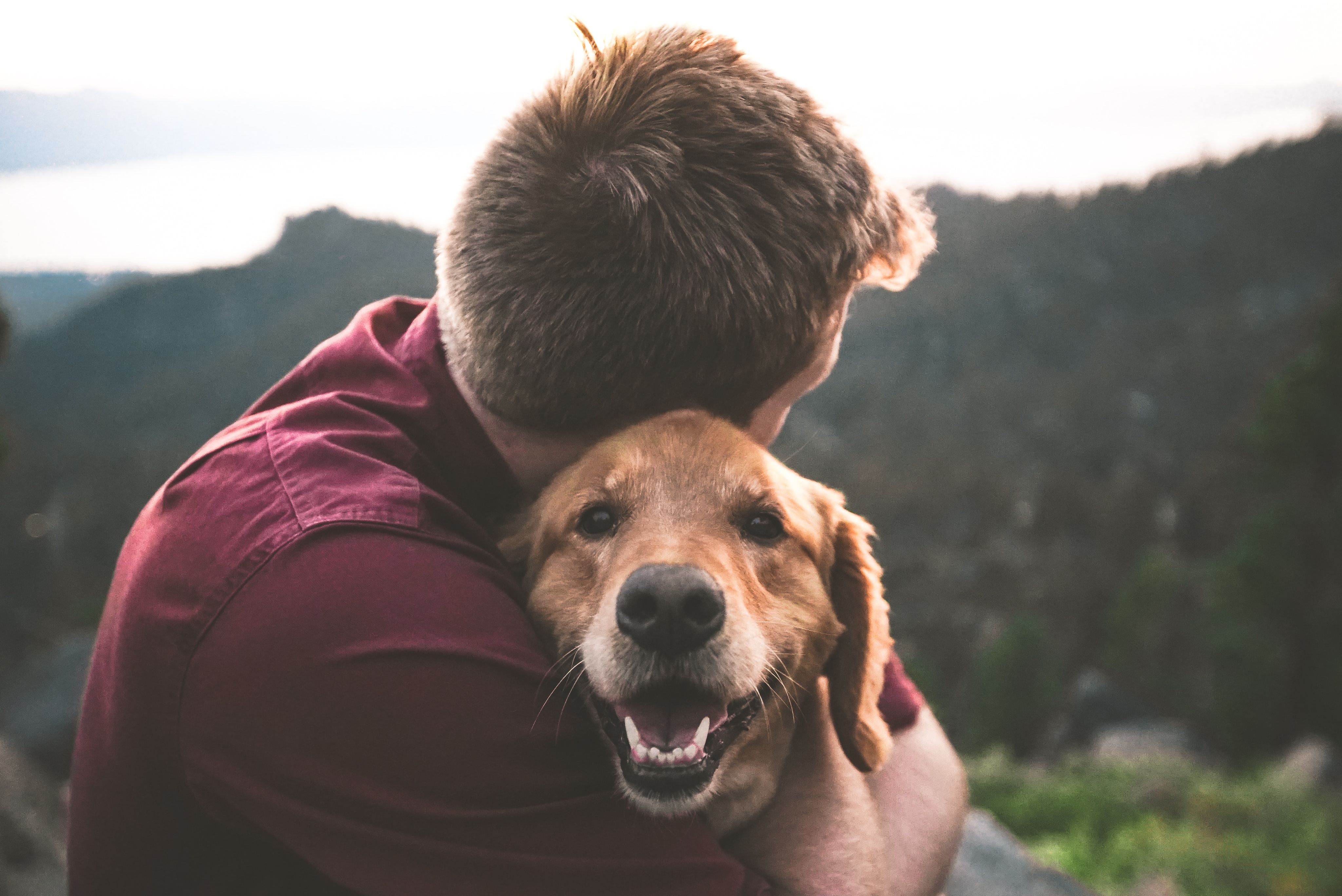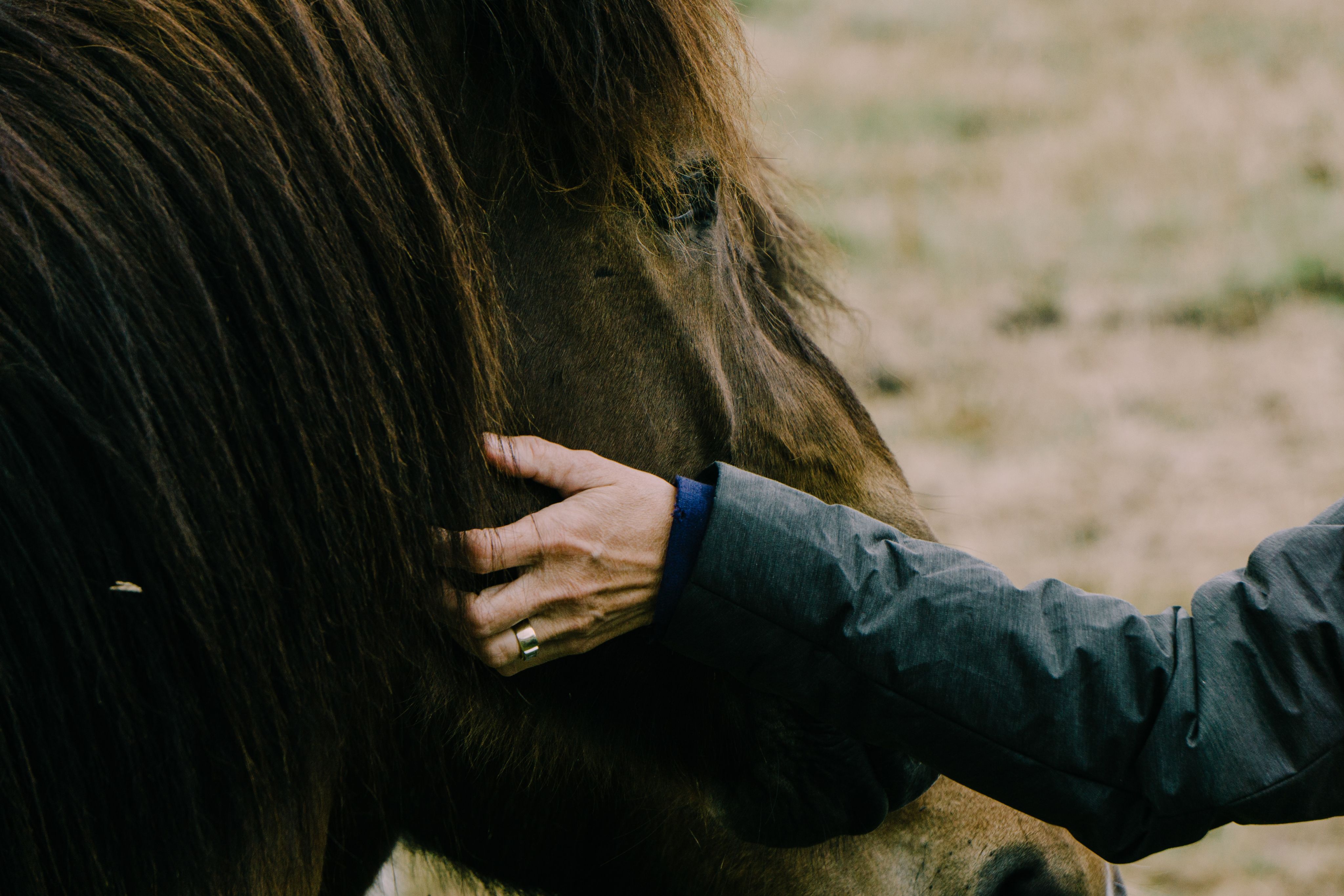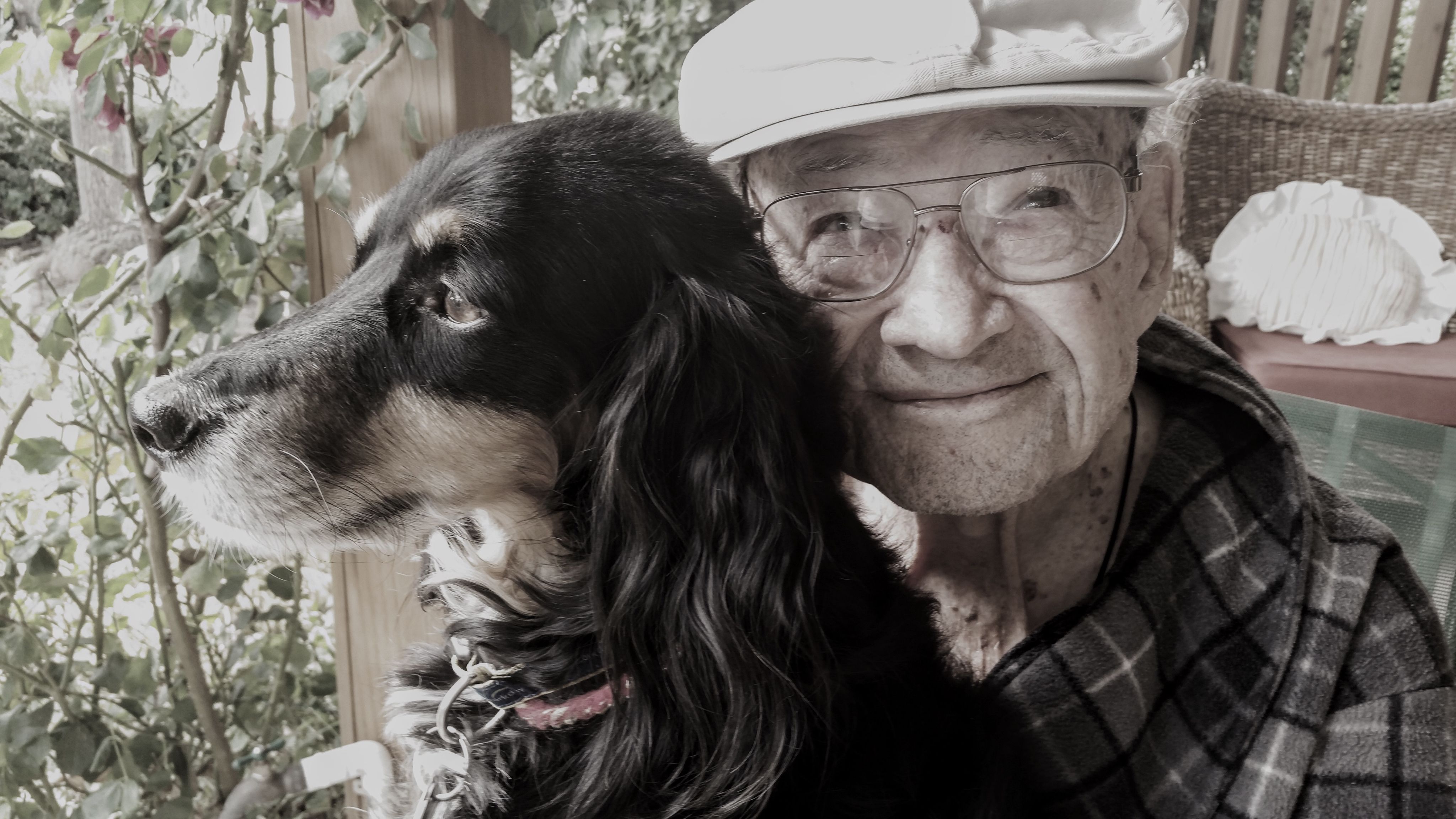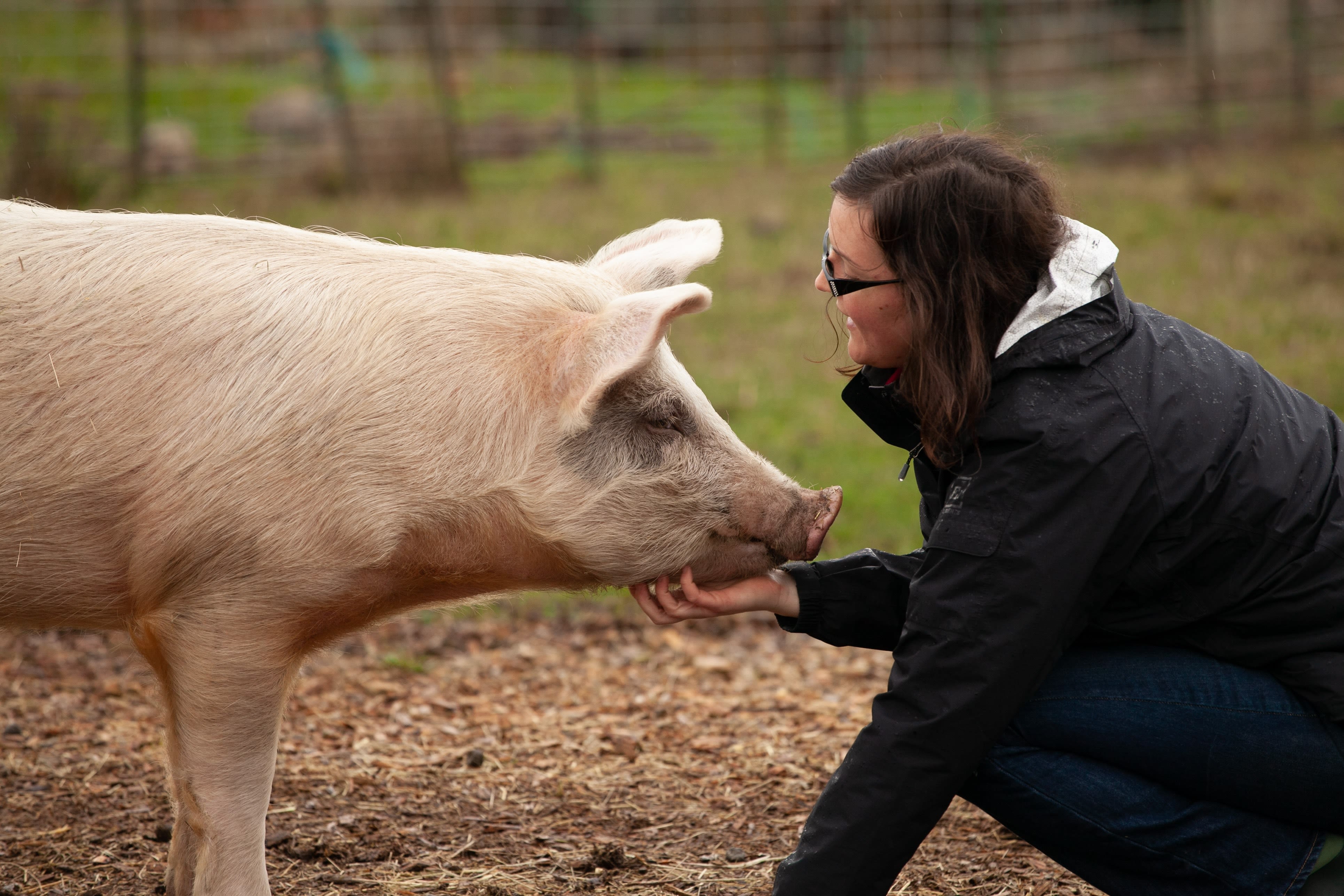Pets & Sexual Abuse Survivors

I stroked the golden fur between Glady's ears. She lifted her head, and her brown eyes looked deep into mine. Her hot breath panted against me. Her long tongue hung slightly over her bottom teeth and to the side of her mouth. She licked my cheek and rested her head back on my thigh. The dog provided the most amazing comfort and encouragement. (Cracked Surface. p. 93)

Photo by Daniel Lincoln on Unsplash
Photo by Daniel Lincoln on Unsplash
There is nothing like coming home to find your pet waiting for you with an unconditional love look in its eyes.
It does not matter how long you were away; you could have just stepped out to get the mail, and the excitement your pet demonstrates when it sees you can change your mood.
Even when you are having a bad day or just received challenging news, your pet seems to sense your mood change and places a paw or chin on your lap.
Studies have shown that the unconditional love of a pet can do more than keep humans company. Pets decrease stress, improve heart health, and can assist with emotional and social issues (News in Health, 2018).
It is estimated that the human-animal relationship has been going on for over tens of thousands of years, and the first pet may have been a dog. Human's long-time engagement with animals is going strong today, with Americans owning some 78 million dogs, 85 million cats, 14 million birds, 12 million small mammals, and 9 million reptiles (Ault, 2016)
According to the American Veterinary Medical Association (AVMA), the human-animal bond is a mutually beneficial and dynamic relationship influenced by behaviors essential to health and wellbeing, including emotional, psychological, and physical interactions.
Imagine how pets can assist survivors of sexual abuse.
Nancy Lee Gerson, the award-winning author of The Horse Who Changed My Life: My Serendipitous Journey through Equus, certified Equine Coach, and retired attorney, shared, "Of course, much healing can also come from simply cohabiting with a pet, be it a dog, cat, chicken, rabbit, gerbil, or other sentient beings. Still, in the case of abuse, sexual, physical, verbal, or all of the above, experimental (so-called Gestalt-based) Equine therapy would be at the top of my list of recommendations."

"Their unconditional love is the greatest gift. No person can truly love in the same way our pets love us. Mike [Husband] does not greet me in the morning or when I come home with his tail wagging and butt shaking" (Cathy Studer, author, speaker, advocate, and survivor).
Pets' Superpower
Studies have indicated that pets' superpower may be empathy. PetMD declares that many pets are physical and seek each other (or humans) out during stressful or emotional times. If one dog licks another's face after a veterinary appointment or rubs its body against another during a thunderstorm, it is the animal's way of showing empathy. Pets are sensitive to human changes of emotional stress and will try ways to alleviate it.


Photo by atwena Goodman on Unsplash
Photo by atwena Goodman on Unsplash
The ancient philosopher, Pythagoras, believed animals possessed the full range of human emotions. Charles Darwin wrote, "There is no fundamental difference between man and the higher mammals in the mental facilities." Professor, Dr. Marc Bekoff states, "We know that fish are conscious and sentient; rats, mice, and chickens display empathy and feel not only their own pain but also that of other individuals" (UWA.edu).
Emily M. Sanford, Johns Hopkins University, created a study demonstrating that "dogs not only feel empathy towards people but in some cases also act on this empathy" (2018).
Elephants had even demonstrated that they could mourn for humans when the founder of Thula Thula Reserve with African Elephants, Lawrence Anthony, passed. The herd of elephants traveled to the conservationist's home to pay their respects, which was remarkable even though they grieved members of their herd.
We have heard and read stories of pets finding their way back to their owner and mourning the loss of another animal or owner. Hollywood has depicted such occurrences in many movies.
Animals' empathy spans species and continents and is demonstrated toward humans and other animals through comforting, grieving, and rescuing another from harm at their own expense (UWA.edu.)
"I have been going through a very depressing time—the world, weather, et al. I would not have gotten through it without my beloved Snooks, my gray and white cat who loves to sleep on newspapers and cannot get enough of the roast beef I bring home from the market. An animal's love is so complete, and they are always THERE for you, unlike some humans" (Bob Garvin).
Why Are Pets Good for Survivors?
Pets can be a vital asset in a survivor's healing journey. Research has shown that survivors of sexual assault and/or abuse are at a higher risk of developing depression, post-traumatic stress disorder (PTSD), substance use disorders, eating disorders, anxiety, and other mental health issues.
Nancy Lee Gerson stated, "The multilayered and complex nature of trauma caused by sexual abuse, for example, is, in my personal opinion, best served by taking a deep dive into therapies that recognize and acknowledge that the physical nature and locus of the trauma must be addressed and exorcised, so to speak. All unresolved emotions—all unfinished business, as it were—don't merely dwell in our minds or hearts but within our actual physical bodies as well. And while traditional talk therapies often achieve excellent results for clients, other times it does not."
So, can pets truly provide humans assistance?
Many research studies have illustrated how dogs have been beneficial with veterans, autistic children, mental health issues, help detect if the owner's insulin is dropping, assist in other medical problems, and are helpful with survivors of traumatic events. Comfort dogs were used during the healing process of the survivors of the Sandy Hook Elementary School shooting.


Photo by Jonas Vincent on Unsplash
Photo by Jonas Vincent on Unsplash

Photo by Jack Brind on Unsplash
Photo by Jack Brind on Unsplash
Robert Williams, the founder and CEO of Ranch Hand Rescue, states that 1 to 8% of individuals, primarily children, need a different or more alternative approach to mental health counseling. Some children will tell an animal something before they confide in an adult.
According to PAVE, Emotional Support Animals (ESA) provide support, comfort, and help survivors with:
- Lowering Anxiety
- Trauma Support
- Loneliness
- Enhancing social engagement and interaction
- Normalizing heart rate and blood pressure
- Reducing pain and stress
- Increasing pleasure
- Reducing depression.
It is important to remember that these animals are not just pets—they are essential support systems for survivors.
While all pets support their owners, survivors can consider and register their pets as ESA by having a medical practitioner deem it necessary for the owner's wellbeing. A registered ESA is necessary to many survivors by allowing the ESA to travel, lodge, and reside in designated "non-pet" housing, according to the U.S. Department of Housing and Urban Development. Anyone can apply to have their pet registered as an ESA.
Dr. Julie Servaites of veterinary medicine warns, "I'll be honest. If animals are not Therapy trained, I think it's a lot, emotionally and physically, to put on an animal whose main purpose is to take on a survivor's emotions." It is essential to consider the pet's personality and demeanor when considering it as a registered ESA.”
"My cat and her purring definitely have a calming and soothing effect. When I am anxious, petting her helps me relax" (Tamra Payne).
How are survivors good for pets?
Survivors can be a vital asset to pets. Many survivors strive to find ways to demonstrate to themselves that even though the traumatic event has caused them to shut off from society temporarily, they can still meet the basic levels of Maslow's hierarchy of needs of physiological (food, shelter, and clothing), safety (health, personal security and freedom from danger), and love/belonging (personal safety, friendship, and sense of connection) to reach the needs of self-esteem and self-actualization.
Once a survivor experiences a traumatic event, these basic needs come into question, creating confusion and untrustworthiness. The survivor's world turns upside down. It is almost like starting all over again, and we must reevaluate our interpretation of what physiological, safety, and love/belonging mean. These needs usually need to be met to function in the world daily.
In my case, I transferred these basic needs onto a pet while traveling on my healing journey. This capacity to focus on my pet gave me the essential feelings of the importance of belonging, feeling safe, and contributing, which aided in me learning to trust again and providing the pet with a safe and loving environment.
These reasons, among others, make survivors excellent companions to pets.

"I find dogs are much smarter than people give them credit for being. They are extremely sensitive to when you need love and comfort" (Jo Groth).
How Do Pets Benefit Male Survivors?
Pets can provide a reprieve for male survivors from the exhausting implications of social stigmas, Toxic masculinity, and what it is to be a man. In the privacy of their home, male survivors can connect with a pet in a way they may not be able to with a human.
The relationship between a pet and a male survivor is unique and different. This bond is almost unexplainable. Although every person has a connection to their pet, a male survivor's relationship goes deeper, which can give them much self-healing since many males refuse to report or seek professional help.
There is little to no research on how pets assist male sexual abuse survivors; almost all studies have focused on females and children.
Studies have shown how service dogs have helped veterans deal with physical and mental issues; now, service dogs are being looked at as ways to help sexually abused survivors. The Atlantic (2017) reported, "Experts say that service dogs could be beneficial for sexual-assault victims as well and may even be uniquely suited to help them overcome their issues with trust and relationships."
Nancy Lee Gerston added, "Equine-facilitated Therapy is an amazing field of healing in this regard. For the past few decades, it has become easier to find therapists in this field in one's residential area."

“I thought I could handle the secrets of being abused and just get over it— these secrets led to misunderstanding and acting out. When I got a pet, it showed me that I could love and care about a living being and it was safe to receive love. And by loving this incredible soul, I was no longer alone or felt alone. I mattered” (Anonymous Male Survivor).

Photo by freddie marriage on Unsplash
Photo by freddie marriage on Unsplash

Photo by Diana Parkhouse on Unsplash
Photo by Diana Parkhouse on Unsplash
The Responsibility of Caring for a Pet.
If you are not an "animal person," having a pet may not provide health benefits or improve your life. There is much more to having and caring for a pet. According to the article "The Health and Mood-Boosting Benefits of Pets" for HelpGuide.org by Lawrence Robinson and Jeanne Segal, "Owning a pet is beneficial and comforting only when the owner is responsible to keep the pet happy and healthy." They provide these things to take into consideration:
- A major commitment that will last throughout the animal's lifetime, like 10-15 years for a dog.
- At the end of the commitment, the grief and morning that comes with losing a beloved pet.
- Pets cost money: Food, proper veterinary care, licenses, grooming, toys, bedding, boarding fees, and other maintenance.
- Pets require time and attention.
- Pets can curb some of your social activities.
- Pets can be destructive, causing accidents on the floor; cats may shred upholstery, and dogs chew shoes.
- Pets can be a health risk to some—those with allergies to the animal.
Make sure you consider the responsibilities when thinking about purchasing or adopting an animal as a pet.
"My dog, who's really a gremlin in disguise, has brought me more comfort and therapy through my days" (Angie Conn)
How Losing a Pet Affects a Survivor
Sometimes losing a pet can be more detrimental for a survivor than losing a human—because of the unconditional love, attachment, trust, and best-friend ideology. According to S. Caroline Taylor and Lauren J. Breen (2014), when a survivor's pet dies or is otherwise lost, it can trigger a grief response that can be substantial and emotionally traumatizing and has been connected to severe illnesses, suicidal ideation, and impairments in quality of life. This loss can also lead to isolation, exacerbated distress of losing a companion and its unconditional love, and disrupt the survivor's healing process.
During Covid in 2021, I lost my Boston Terriers (Bella and Barkley) within five months of each other. The initial sadness of losing them was one thing, but the slow and debilitating state of depression took a toll that still affects me today. As a male survivor, these two pets were my best friends and companions and gave me the strength to face each day. I felt lost and confused as to why they were taken away. I knew I depended on these two pets' unconditional love and support, so my partner and I adopted two new Boston Terrier puppies (Bandit and Bear). Taking on the responsibility to provide love, support, and a warm home to these two pups helped me with my depression. Not a day goes by that I do not think about Bella and Barkley, but I see the incredible qualities that Bandit and Bear are providing me.

"I miss my Pheobe Anne. She helped me get up and get outside every day. She gave me focus outside of myself. I miss her every day" (Tina M. Durbin).
Types of Pet Therapies
Many different animals can provide therapeutic benefits; here are some examples:

Photo by Pauline Loroy on Unsplash
Photo by Pauline Loroy on Unsplash
Animal-Assisted Therapy
This involves animals specially trained to assist physical and occupational therapists with their patients. Pets can improve patients' limb mobility and fine motor skills as they stroke their coats. Imagine how a game of fetch could help improve a patient's physical AND mental state! Plus, therapy pets help patients relearn pet care skills so they can take care of their pets when they return home.

Photo by David Dibert on Unsplash
Photo by David Dibert on Unsplash
Equine Assisted Therapy
This encompasses a range of treatments involving horses' activities to promote human physical and mental health.

Photo by Rex Pickar on Unsplash
Photo by Rex Pickar on Unsplash

Photo by Chris Arthur-Collins on Unsplash
Photo by Chris Arthur-Collins on Unsplash

Photo by Donna Cecaci on Unsplash
Photo by Donna Cecaci on Unsplash
Facility Therapy
Therapy pets often reside at the care center and are trained to monitor and engage patients with Alzheimer's disease or mental illnesses. They learn the limitations and boundaries of the residents and help keep them safe.

Photo by Delbert Pagayona on Unsplash
Photo by Delbert Pagayona on Unsplash
Fish Therapy
Watching fish through your fish tank, visiting an aquarium, or in a natural environment can provide therapeutic benefits.

Photo by BAILEY MAHON on Unsplash
Photo by BAILEY MAHON on Unsplash
Goat Therapy
This is a form of animal-assisted Therapy that comes in many forms, such as mindfulness with goats, goat yoga, painting with goats, Tai Chi with goats, petting and brushing goats, and cuddling goats. Cuddling goats provides deep serenity, leaving one feeling more relaxed, focused, and grounded.

Photo by Nils Schirmer on Unsplash
Photo by Nils Schirmer on Unsplash
Guinea Pig Therapy
Guinea pigs can be emotional support animals. Handling and petting guinea pigs have proven very therapeutic.

Photo by Zosia Korcz on Unsplash
Photo by Zosia Korcz on Unsplash
Llama Therapy
Llamas and alpacas are also a good alternative for people who think "dogs are a little too much, or [have] had a bad experience with them.

Photo by Yerlin Matu on Unsplash
Photo by Yerlin Matu on Unsplash
Pet Therapy
This is to help people cope with health or emotional problems and make them feel good.
Pig Therapy
Pigs can participate in therapy pet services offered wherever, but again, this is a difficult test and usually takes a significant amount of training before a pig is ready to be tested out. There are several types of therapy pets, but pigs CAN be certified as therapy pets.

Photo by Ralph (Ravi) Kayden on Unsplash
Photo by Ralph (Ravi) Kayden on Unsplash
Service Dogs
Service animals live with a disabled person and perform assistance tasks.

Photo by Reba Spike on Unsplash
Photo by Reba Spike on Unsplash
Therapy Pets
Therapy pets live with their owners and are regular pets. They visit people at health care facilities but do not "belong" to any one patient and are not specifically assistance trained. Therapy pets are an asset to health care and have an important job, helping children and adults with various physical and mental issues.

Photo by James Sutton on Unsplash
Photo by James Sutton on Unsplash
Therapeutic Visitation
This is the most common type of pet therapy, in which owners take their pets to visit healthcare facilities. Many hospitalized patients miss the pets they left at home. A visit from a pet can motivate them to get better so they can return home to their pets.
Who should not participate in pet therapy?
Pet therapy is excellent, but it is not for everyone. Some people do not like animals, and being around a pet may increase their stress levels. Patients with weak immune systems also must be very cautious about their contact with pets in case of any asymptomatic infectious diseases the pet may be carrying.

I would like to thank Nancy Lee Gerson and Dr. Julie Servaites, and the people who provided interviews and quotes.
References
Ault, A. (2016, September 28). Ask Smithsonian: When Did People Start Keeping Pets? Smithsonian Magazine; Smithsonian Magazine. https://www.smithsonianmag.com/smithsonian-institution/ask-smithsonian-when-did-people-start-keeping-pets-180960616/
Can Dogs Empathize With Other Dogs’ Emotions? (n.d.). Www.petmd.com. https://www.petmd.com/dog/pet-lover/can-dogs-empathize-other-dogs-emotions
How Emotional Support Animals Help Survivors. (n.d.). PAVE. Retrieved April 7, 2023, from https://www.shatteringthesilence.org/blog/how-emotional-support-animals-help-survivors
Human-animal bond. (n.d.). American Veterinary Medical Association. https://www.avma.org/one-health/human-animal-bond#:~:text=The%20human%2Danimal%20bond%20is
Nancy Lee Gerson. (n.d.). Nancy Lee Gerson. Retrieved April 7, 2023, from https://www.nancyleegerson.com/
The Power of Pets. (2018, February 1). NIH News in Health. https://newsinhealth.nih.gov/2018/02/power-pets#:~:text=Nothing%20compares%20to%20the%20joy
Robinson, L. (2019). HelpGuide.org. HelpGuide.org. https://www.helpguide.org/articles/grief/coping-with-losing-a-pet.htm
Robinson, L., Lundgren, K., & Segal, R. (2019, February 13). The Health and Mood-Boosting Benefits of Pets. HelpGuide.org. https://www.helpguide.org/articles/mental-health/mood-boosting-power-of-dogs.htm
Trauma Therapy, Safe House, Animal Sanctuary. (n.d.). Ranch Hands Rescue. https://ranchhandsrescue.org/
UWA. (2019, April 3). Do Animals Have Feelings? Examining Empathy in Animals. UWA Online. https://online.uwa.edu/news/empathy-in-animals/#:~:text=We%20know%20that%20fish%20are


About the Author:
John-Michael Lander is a Survivor, Advocate & Public Speaker
He is also the founder of An Athlete's Silence: www.anathletessilence.com

Published by SurvivorSpace, an initiative of Zero Abuse Project




